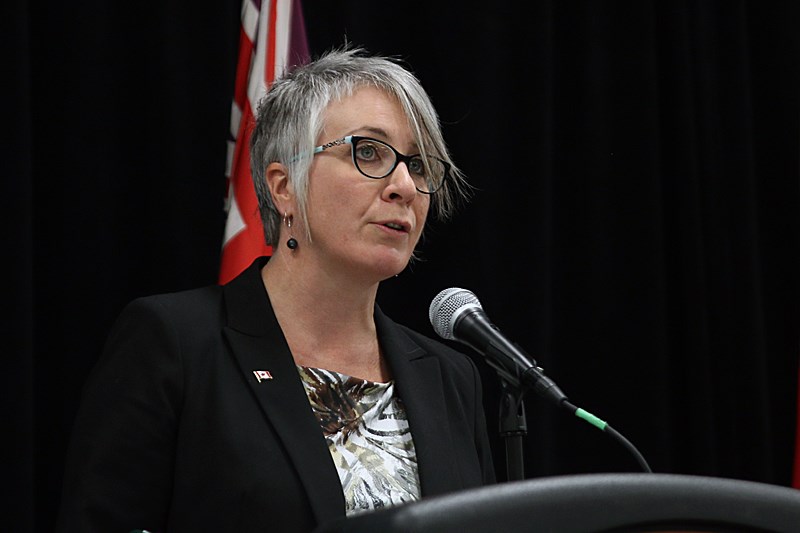THUNDER BAY – Health Minister Patty Hajdu is “cautiously optimistic” about Canada’s progress in fighting the spread of COVID-19, she told northern Ontario business leaders Tuesday. But on the economic front, Hajdu and other Liberal MPs from the region painted a darker picture, warning there's no going back to a pre-COVID-19 reality, and that federal financial supports could not last forever.
The comments came at a virtual town hall organized by regional chambers of commerce and featuring the Liberals’ northern Ontario caucus, consisting of Hajdu and fellow MPs Marcus Powlowski (Thunder Bay), Terry Sheehan (Sault Ste. Marie), Marc Serré (Nickel Belt), and Paul Lefebvre (Sudbury).
Early in her comments, Hajdu acknowledged how difficult the pandemic had been for business owners, crediting their sacrifices as crucial in Canada’s fight against the virus.
“When I think about the sacrifice business has made to help flatten the curve – your businesses were at the forefront of taking those really hard decisions in the early days,” she said. “We know the sacrifices you’ve made are extreme and extraordinary.”
Hajdu said indicators like Canada’s R0 (pronounced R-naught, indicating the average number of people someone with the virus goes on to infect) – now sitting slightly below one – gave her cause for cautious optimism.
That optimism was in shorter supply when it came to the economic picture. Asked about the government’s plan to avert a recession, Lefebvre flatly asserted that was already a reality.
“We are in a recession, I think there’s no doubt about that,” he said.
The pandemic represents uncharted waters economically, according to Hajdu.
“We’ve said it a lot, these are unprecedented times,” she said. “Economic policy that’s well understood generally doesn’t account for a supply and a demand shock at the same time. There’s sort of no precedent in our history – at least our recent history – on what to do next.”
The MPs took pains to highlight financial supports put in place by their minority government, saying they were similarly unprecedented in their scale. Sheehan said nearly 8 million Canadians had now received support through the Canada Emergency Response Benefit (CERB), while many others were kept employed thanks to a 75 per cent wage subsidy program.
The MPs also touted the more recently introduced CESB for post-secondary students, though they pointedly did not answer a question about why that benefit is pegged much lower than the CERB.
Internet infrastructure in the north was one of the top concerns from business leaders, particularly as the pandemic forces many to work from home. Other top issues included the perennial northern Ontario desire for access to passenger rail (“The holy grail of politics in Thunder Bay is to bring the train back,” joked Powlowski), support for the natural resource industry, and how the government would support businesses with the new costs of doing business in the age of COVID-19.
A direct answer to that last question wasn’t forthcoming, but the representatives acknowledged businesses were faced with adapting to what Hajdu called “the living-with-COVID reality.”
“There’s a lot of work reimagining how we offer services and products to our customers in a safe way,” said Hajdu.
The Health Minister told the online audience employers would have a major part to play in safely reopening society, predicting it would require a fundamental shift in how workplaces operate.
“You’re going to have a critical role supporting the wellness of your workers, and creating a culture where it’s part of our practice to talk about how we keep each other healthy,” she said.
That includes a rethink around how employers manage sick leave, she told business leaders.
“I know we’re in a jurisdiction in Ontario where there’s no requirement for anyone to provide paid sick leave,” she said. “But as employers, it’s going to be important to think about how we encourage people not to come to work when they’re sick, so they don’t infect the rest of your staff and your customers.”
MPs emphasized that large financial support programs like the CERB, CESB, and wage subsidies were intended as short-term measures. However, they hinted that the government intended to provide significant financial stimulus to get the economy back on its feet, particularly through infrastructure spending.
“We’re going to slowly start to look at measures we can remove, and then replace with other stimulus measures to make sure we can drive the economy forward,” said Hajdu.
“A lot of our measures were to stabilize [the economy],” Sheehan agreed. “We know eventually, we’ll get back to more traditional stimulus funding such as in 2008, where we’re looking at building, universities and colleges, [and] putting money in people’s pockets with the intention for them to spend on Main Street.”
